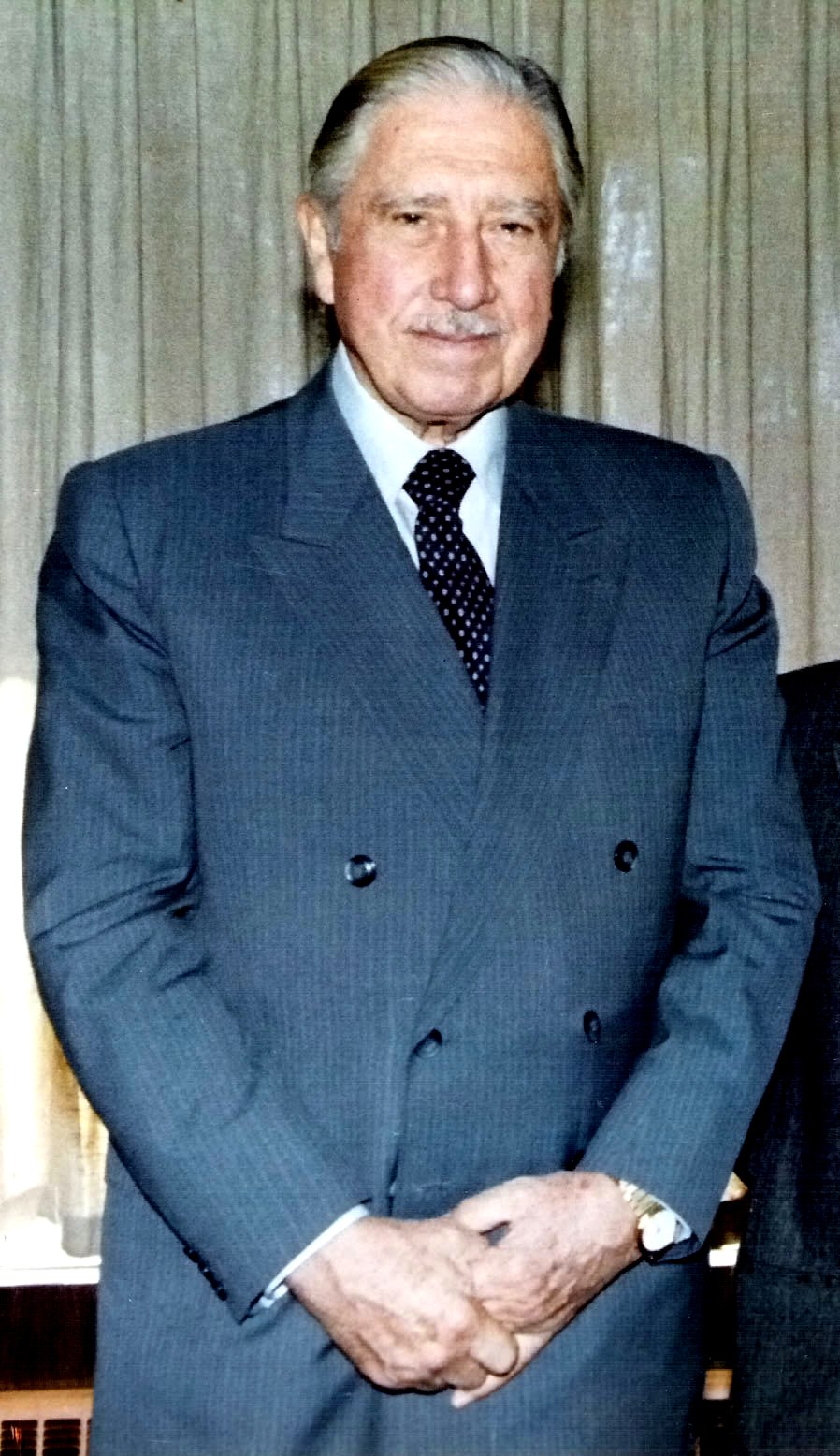“We practically wiped this nation clean of Marxists.”
Speech (February 23, 1988), quoted in "Las frases para el bronce de Pinochet."
1980s
Generál Augusto José Ramón Pinochet Ugarte bol vodcom pravicovej vojenskej diktatúry, ktorá vládla v Čile v rokoch 1973 až 1990.
K moci sa dostal počas prevratu, ktorý zosadil vtedajšieho prezidenta Salvadora Allendeho, lekára a marxistu, ktorý bol prvým socialistickým prezidentom Čile. Prevrat ukončil obdobie napätých vzťahov medzi Čile a USA, ktoré sa aktívne snažili zbaviť Allendeho moci a umožnil Pinochetovi realizovať hlboké neoliberálne ekonomické reformy.
11. septembra 1973 armádne jednotky podporované tankmi a letectvom, vedené Pinochetom zaútočili na prezidentský palác a prevzali moc od prezidenta Allendeho, ktorý vzápätí spáchal po krátkom, ale intenzívnom boji samovraždu. Bola ustanovená junta vedená Pinochetom, ktorá okamžite pozastavila ústavu, rozpustila kongres, zaviedla prísnu cenzúru, zakázala činnosť ľavicovo orientovaným politickým stranám, ktoré tvorili Allendeho koalíciu a zastavila všetky politické aktivity v krajine. Pinochetova junta rozpútala kampaň proti svojim oponentom; viac než 3000 Čiľanov bolo popravených, tisíce ľudí z radov ľavice, ku ktorej sa rátali aj kresťanskí socialisti, bolo uväznených, mučených, prípadne bez stôp zmizli. Mnoho z týchto ľudí bolo vypovedaných z krajiny a prijatých v zahraničí ako politickí utečenci. Často boli prenasledovaní čilskou tajnou políciou aj mimo svojej krajiny v rámci tzv. Operácie Kondor.
V roku 1980 bola schválená nová ústava, ktorá nariaďovala prezidentské referendum s jedným kandidátom v roku 1988 a návrat k tradičnému politickému zriadeniu v roku 1990. Pinochet prehral referendum v roku 1988, čo vyústilo do viackandidátskych prezidentských volieb v roku 1989. Novozvolený prezident Patricio Aylwin prevzal od Pinocheta moc v roku 1990, aj keď ten ostal na svojom poste vrchného veliteľa armády až do roku 1998, keď získal doživotné kreslo v čilskom senáte, ktoré mu zaisťoval ústavný dodatok z roku 1980.
Wikipedia

“We practically wiped this nation clean of Marxists.”
Speech (February 23, 1988), quoted in "Las frases para el bronce de Pinochet."
1980s
“Tell my friends to get me out of here.”
October 27, 1998, nine days after being arrested in London, quoted in Heraldo Muñoz (2008) The Dictator's Shadow
1990s
“I'm looking at them from above, because God put me there.”
Speech (July 1987), quoted in "Las frases para el bronce de Pinochet."
1980s
Statement (8 November 1998)
1990s
“The only solution to the issue of human rights is oblivion.”
Speech (21 September 1995), quoted in "Las frases para el bronce de Pinochet."
1990s
Interview (1989) quoted in " "Ego sum Pinochet" 1989, Inteview to Augusto Pinochet, authors Raquel Correa and Elizabeth Subercaseaux. http://www.guerraeterna.com/archives/2006/12/pinochet_y_hitl.html"
1980s
“Had I been a dictator, I would still be governing.”
Speech (December 31, 1995), quoted in "Las frases para el bronce de Pinochet."
1990s
“My library is filled with UN condemnations.”
Speech (26 December 1986), quoted in "Las frases para el bronce de Pinochet."
1980s
Speech (10 November 1995), quoted in "Las frases para el bronce de Pinochet."
1990s
“I devalued the peso solely looking after the poor.”
Speech (29 June 1982), quoted in "Las frases para el bronce de Pinochet."
1980s
Exchange between Judge Victor Montiglio and Pinochet (November 16, 2005), quoted in Heraldo Muñoz (2008) The Dictator's Shadow
2000s
Clive Foss, The Tyrants: 2500 Years of Absolute Power and Corruption, London: Quercus Publishing, 2006, ISBN 1905204965, p. 187
Attributed
“I have a sour face. Maybe that's why they say I'm a dictator.”
Speech (24 April 1986), quoted in "Las frases para el bronce de Pinochet."
1980s
“This is not a dictadura [dictatorship/hard rule] but a dictablanda”
soft rule
Speech (September 1983), quoted in "Las frases para el bronce de Pinochet." The Spanish word dura means tough, while blanda means soft.
1980s
“I was only an aspiring dictator. I was never a real dictator.”
November 1998, during detention in London http://www.lanacion.cl/prontus_noticias/site/artic/20061210/pags/20061210221221.html
1990s
“Not a single leaf moves in this country if I'm not the one moving it. I want that to be clear!”
Speech (October 1981), quoted in "Las frases para el bronce de Pinochet." This expression is not original to Pinochet; it is also attributed to Inca Atahualpa in 1531. See Las Casas, Destruction of the Indies.
1980s
Press conference (11 September 1973) Youtube.com https://www.youtube.com/watch?v=6Hbhb0ozRuM
1970s
“I am going to die. The person who succeeds me also would die. But elections, you won't have.”
Speech (17 June 1975), quoted in "Las frases para el bronce de Pinochet."
1970s
Statement (8 November 1998)
1990s
Speech (26 May 1988), quoted in "Las frases para el bronce de Pinochet."
1980s
Speech (17 April 1989), quoted in " Las frases para el bronce de Pinochet http://www.lanacion.cl/prontus_noticias/site/artic/20061210/pags/20061210221221.html" (2006-12-11) La Nación
1980s
Speech (11 September 1979), quoted in "Las frases para el bronce de Pinochet."
1970s
Comments at Mass (11 September 1994), quoted in Calvin Sims (1994-10-06) "Villain or Hero? Pinochet Is Still Viewed as Both in Chile" New York Times
1990s
Speech (25 October 1988), commenting on his defeat in a plebiscite to return to democracy. Quoted in Pamela Constable et al. (1991) A Nation of Enemies
1980s
“The nation is trying to make Chile a country of proprietors, not of proletarians.”
Speech (24 April 1987), quoted in "Las frases para el bronce de Pinochet."
1980s
Birthday announcement (25 November 2006); " Pinochet Takes 'Political Responsibility' for Actions of Chilean Dictatorship http://www.washingtonpost.com/wp-dyn/content/article/2006/11/25/AR2006112500834.html" (26 November 2006) Washington Post
2000s
“The country is safe, because we have a good intelligence service.”
Speech (September 1974), quoted in La Nación (2006-12-11) "Las frases para el bronce de Pinochet" (The Immortal Sayings of Pinochet) http://www.lanacion.cl/prontus_noticias/site/artic/20061210/pags/20061210221221.html
1970s
